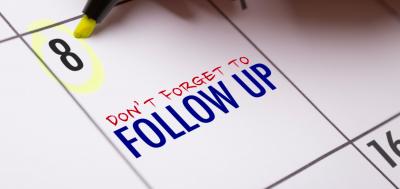Learn more about what you can expect from your online experience at Champlain.
You've aced your final job interview: your body language was perfect, you did your research beforehand, and you remembered to ask some thoughtful questions. The final step before sitting back and waiting for the phone to ring with a job offer? The followup note.
Although this seems like it's a fairly straightforward step, it's actually one of the places that people get stuck on the most. If you're wondering how to write a followup email, here are the things you should keep in mind - and the things you should avoid doing.
How to Write a Followup Email
Do Find a Template That Works For You
As with a cover letter and resume, a thank you note is something you should build an effective template for, which you can then tailor for each person you send it to. This structure will, of course, vary depending on the types of roles you're applying for and your individual style, but should typically include:
- A Thank-You: Thank your interviewer for taking the time to speak with you
- What You Learned: Highlight one or two things that either changed or reinforced your perceptions of the company and/or the position.
- Anything Memorable: If you made a personal connection with your interviewer (for example, learned that they're a fellow alum of your college, or that you've both volunteered for the same organization), bring it up again!
- Reiteration of Interest: Tell them again that you're very interested in the role (if that's true) and that you're looking forward to hearing of their decision.
Don't Feel Like You Have to Send a Letter
Traditionally, the post-job interview note was handwritten, and sent through the mail. However, this is a somewhat outdated rule - the vast majority of employers won't think twice about getting an email instead of a note. Additionally, letters can often get lost in the shuffle, or sit for days in an unchecked mailbox. A handwritten note is a lovely gesture, but in the interest of timeliness and adherence to today's business best practices, a thank you email after the interview is usually your best bet. And if you really want to send a note by mail, send it in addition to - not instead of - an email.
Do Follow Up On Specifics
The followup note is a great place to follow up on specifics that were brought up in the interview. If you discussed a blog post you wrote or a project you executed, send them relevant materials. If they asked for a writing sample, include a link to your portfolio; if they asked for a list of references, get them all of the contact information they'll need. Including this (without them having to ask you again) will show that you're reliable and on top of things.
Don't Be Too Wordy
Keep it short! Your note should be no more than a couple of paragraphs, each of those containing 2-3 sentences. Your interviewer is likely busy and receives a lot of communication; you'll be able to get your point across more effectively if you keep your note brief and to the point.
Do Mention Anything You Forgot to Bring Up During the Interview
Interviews are high-pressure situations, so it's easy to forget to ask a key question or bring up a relevant piece of information in the moment. If you remember something you forgot to mention during the interview that might strengthen your candidacy, feel free to include a line briefly explaining what it was.
Don't Send It Immediately After the Interview
One of the biggest questions people have about thank you notes is around how soon to send a follow up email after the interview. Whatever you do, don't draft up an email and press send as you're walking out of the office (or worse, write a note and hand it to the receptionist as you leave). Even if you're using a basic template, your note should be thoughtful, genuine, and reflective of the actual interview - not just a perfunctory gesture. Ideally, you should send the note within 24 hours of the interview, which is enough time for you to think over the experience and craft a tailored note, but not so long that the interviewer will have put you out of mind.
Do Send a Note to Everyone You Interviewed With
In many cases, especially in later-stage interviews, you'll interact with multiple people over the course of the day. You should take the time to write a quick followup email to each of them, taking care to differentiate each note slightly - you can be sure that they'll be comparing notes, and they'll notice if you send the same note to all of them.
If you don't have the full names or contact information for these other individuals, try to do a bit of digging on LinkedIn or the company website. If this doesn't yield what you're looking for, it's acceptable to include a line in your note to your primary interviewer or your main point of contact with the business stating that it was a pleasure to meet with the whole team, and you hope that they'll pass on your thanks.
Don't Be Pushy
Some individuals suggest closing your note with an assertive line stating that you'll call the interviewer within a few days to find out what their decision is, or recommend following up via additional emails and phone calls in the days after you send the email. Respect the employer's timeline: while it's fine to ask your interviewer when they expect to make a decision, and to follow up once or twice after your initial post-interview note, too much contact could make you come across as too pushy.
Download Online Experience Guide
Learn what you can expect from your experience at Champlain College Online.

Online Experience Guide Download
I acknowledge that, by clicking the "submit" button, I am giving my express written consent to Champlain College and its representatives to contact me about educational opportunities via email, text, or phone, at the phone number above, including my mobile phone, using an automatic dialer, or pre-recorded message. Message and data rates may apply. I understand that my consent is not a requirement for enrollment, and I may withdraw my consent at any time.






